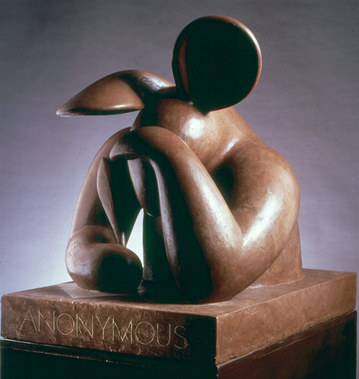The anonymous hand
 On Wednesday, I participated in a wide-ranging discussion of anonymity at Loughborough University, featuring big data, privacy, and illegal drugs. For my bit, I focused on threat models, more commonly talked about in connection with security.
On Wednesday, I participated in a wide-ranging discussion of anonymity at Loughborough University, featuring big data, privacy, and illegal drugs. For my bit, I focused on threat models, more commonly talked about in connection with security.
Timandra Harkness, the presenter of BBC Radio 4's FutureProofing focused on big data and the way size and multiplicity of databases makes protecting our privacy hard; this stuff is hard to anonymize. The situation will soon get much worse. People move to large cities from small towns in part to find relative anonymity, but smart cities will turn everyday infrastructure into data hogs. Soon, we may be migrating ruralwards to get away from park benches that greet us by name and offer to call a vendor selling our favorite beverage.
Tim Jordan, from the University of Sussex, discussed how identification has changed by comparing a cache of 1890s letters to and from Australia with modern gaming chats. Perversely, game worlds' addition of voice chats has made it harder for women to mask their gender, and he stressed the need for better tools to enable people to take the privacy and security they want. A clear gap in the market here, for entrepreneurs: voice-obfuscating home microphones!
 Most unfamiliar to me was Judith Aldridge's work studying digital drug dealers. How do online hidden markets (her preferred term) change things? Is there more or less risk of being caught? Or of violence? Are the drugs better quality? Are there more or fewer scams? Are they cheaper? Tor and bitcoin make it harder to tie user IDs to real-world individuals, but physical goods have to be delivered to an address: the location of that risk has nothing to do with online. Since the takedowns adoption of PGP for communications has risen from 21% to 90%: a worked example of reassessing risk in the light of new information. Even so, buyers in these markets are less likely to report being caught by law enforcement, and violence is less than in physical-world markets, even compared to buying from friends.
Most unfamiliar to me was Judith Aldridge's work studying digital drug dealers. How do online hidden markets (her preferred term) change things? Is there more or less risk of being caught? Or of violence? Are the drugs better quality? Are there more or fewer scams? Are they cheaper? Tor and bitcoin make it harder to tie user IDs to real-world individuals, but physical goods have to be delivered to an address: the location of that risk has nothing to do with online. Since the takedowns adoption of PGP for communications has risen from 21% to 90%: a worked example of reassessing risk in the light of new information. Even so, buyers in these markets are less likely to report being caught by law enforcement, and violence is less than in physical-world markets, even compared to buying from friends.
Anonymity features in all these cases as a tool for a larger purpose, not an end in itself. In the digital rights world, most of us to stress anonymity's valuable protection for whistleblowers, activists in hostile situations, and vulnerable people - LGBTQ teens exploring their sexuality, people with various illnesses seeking support, victims of domestic violence and stalking, and so on. Each of these groups has a different threat model. The last category may need not only to hide from specific abusers but uncomprehending friends and family members who might out their whereabouts. Those seeking support need freedom from consequences while they explore to understand themselves. Activists may be primarily concerned to protect their contacts, who may be in greater danger. Those of us wishing to escape online marketing may care less about links to our real-world identities than we do about stopping ads from interfering with our ability to read the page we've landed on. Many of the most famous whistleblowers - Edward Snowden, Daniel Ellsberg - actually aren't anonymous, or not for very long. The notable exception is Mark Felt, "Deep Throat" in the Watergate investigation, whose identity was known only to journalists Carl Bernstein and Bob Woodward for more than 30 years.
 The image today's governments seem to want us to have is of the shady, dangerous criminal; the closest I can come mentally is the form the invisible man takes in the movie of H.G. Wells's novel: every inch of skin covered. The parts his long coat, trousers, and shoes couldn't reach - his face, mainly - are wrapped in gauze to make them visible, and giant sunglasses hide his eyes. Met in real life he'd definitely be creepy and unnerving. Does that make him a terrorist?
The image today's governments seem to want us to have is of the shady, dangerous criminal; the closest I can come mentally is the form the invisible man takes in the movie of H.G. Wells's novel: every inch of skin covered. The parts his long coat, trousers, and shoes couldn't reach - his face, mainly - are wrapped in gauze to make them visible, and giant sunglasses hide his eyes. Met in real life he'd definitely be creepy and unnerving. Does that make him a terrorist?
My personal preference is the image at the top: Meredith Bergmann's homage to Anonymous, the author of so many songs and stories.
Threat modeling is not conceptually complex, though the exercise may be painful. Essentially, anyone seeking to protect themselves should ask themselves a series of questions that ought to be familiar in broad outline if not intimate detail to anyone who's ever worked as a journalist. Who wants to attack you? What do you have that they want? When are they likely to want it? Where are the vulnerabilities that will help them? Why do they want it?
It's the answers to these questions that may be imponderable. Journalist Matt Honan would never have guessed - until it happened - that someone would leverage his online accounts and wipe all his personal data just to get...his Twitter ID. However, the answers to those questions determine what self-protective moves you need to take. Each situation requires a different response and a different set of protective behaviors, though obviously there's some overlap.
Similarly, if you want to be anonymous, your approach will be different depending on whether you are trying to foment revolution (Thomas Paine, an online troll, or one of a flash ad-hoc collective of hacktivists.
If you are a government - or an intelligence agency tasked to protect one - all of those may seem hugely dangerous and essential to stop. The fundamental question we all have to answer is: does a society require perfect identification in order to be secure? I don't believe it does.
Illustrations: "Anonymous", by Meredith Bergmann; the invisible man; Judith Aldridge.
Wendy M. Grossman is the 2013 winner of the Enigma Award. Her Web site has an extensive archive of her books, articles, and music, and an archive of earlier columns in this series. Stories about the border wars between cyberspace and real life are posted occasionally during the week at the net.wars Pinboard - or follow on Twitter.